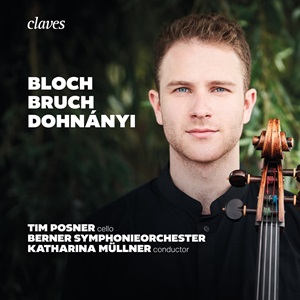
Ernest Bloch (1880-1959)
Schelomo, B. 39 (1917)
Max Bruch (1838-1920)
Kol Nidrei, Op 47 (1880)
Ernö Dohnányi (1877-1960)
Konzertstück, Op 12 (1903-04)
Tim Posner (cello)
Berner Symphonieorchester/Katharina Müllner
rec. 2023, Diaconis-Kirche, Bern (Switzerland)
Claves CD 50-3079 [56]
This CD has come about as the result of young cellist Tim Posner winning the Thierry Scherz Prize at Sommets musicaux de Gstaad 2023 with this major recording as part of the prize. Tim Posner’s rising star has also seen him garlanded as the first British cellist to have been awarded a prize at the International Karl Davidov Competition. His career is already well underway, with numerous solo performances in front of internationally renowned orchestras and a recent post as principal cello of the Amsterdam Sinfonietta to keep him going.
The question as to what repertoire you might select to showcase the cello is an interesting one, but rather than go with the more or less familiar concerto route, Tim Posner already had Ernest Bloch’s Schelomo on his wish list. “It’s a work that I’ve loved since childhood and that I’ve always wanted to play, but as it requires a large-scale orchestra, the occasion never arose.” Building the programme on Schelomo, the Hebrew resonances of Bruch’s Kol Nidrei was a logical choice. Ernö Dohnányi’s Konzertstück was added as a jubilant contrast to the tragic atmosphere of Schelomo, as well as being a piece that is by no means commonly found on any programme, let alone on CD.
Passionately romantic and programmatic in its references to passages of Ecclesiastes, Schelomo is indeed grand in scope, though by no means bombastic in terms of its content or expression. The cello has the declamatory role of Solomon, so although there is much impassioned lyricism, this is a work “of great instrumental and expressive density” rather than one you will come away from with distinctive tunes in mind. This is a great performance filled with colour and committed playing from both soloist and orchestra. There are a few alternative recordings around, including that with Zara Nelsova on the Alto label (review). Nelsova was an artist admired by the composer, and her tight vibrato adds to the intensity of this music, though to my ears the whole thing is wound-up enough already. These Claves recordings capture the deeper resonances of Posner’s cello tone more potently in this version, but both are excellent, the point being that this new release can compete on equal terms with classic reference recordings.
Max Buch’s Kol Nidrei is the best-known work in this programme by quite some distance. Tim Posner’s timing at just under ten minutes follows convention, taking the opening with a spacious expressiveness. It has a more relaxed feel than, for instance, Maria Kliegel’s Naxos recording (8.550519), in which she is more on top of the notes, almost anticipating at times. Posner and the Berner Symphony Orchestra turn in a beautiful performance which will by no means disappoint, but there are more soulful versions to be had.
Maria Kliegel also recorded Ernö Dohnányi’s Konzertstück on Naxos 8.554468 (review), and there is also a more colourful recording from Raphael Wallfisch with Charles Mackerras on the Chandos label CHAN8662 or on re-release CHAN10715X (review). More recently, we have Andrei Ioniţă on the Capriccio label (review). All of these are very good and I began with looking at alternatives just to orientate myself to a work with which I was unfamiliar. This is music that can be performed with full heart-on-sleeve romanticism, but I was happy to hear Tim Posner’s light touch here. He skips with that aforementioned jubilant feel like someone dancing between the roses in a flower garden, responding to Dohnányi’s delightfully idiomatic cello writing that is thankfully almost entirely free of the merciless scrubbing required from some of the repertoire. The balance here is nicely detailed, with greater definition for the soloist than with Ioniţă’s recording, which by turn has quite a cinematic feel in contrast to Posner’s more intimate charm. Marie Kliegel’s playing harks back to what sounds like an earlier tradition, with more sweeping lines and a more portamento feel in those legato passages, certainly with bigger bones than Posner, and as a result more concerto-like in effect. Charles Mackerras drives forward a bit more convincingly in the more dramatic moments of the final Tempo I of this work, but the climaxes are all hit with glorious luminosity by the Berner SO and I have no real complaints. Most of these alternatives divide the Konzertstück into three movements, whereas it appears here on a single track.
This unusual programme works very well indeed, and with superb performances all round, it is an admirable addition to the cello catalogue. Tim Posner is certainly a name to look out for and I am sure he will appear again, hopefully with an equally imaginative approach to the choice of music.
Dominy Clements
Help us financially by purchasing from



















